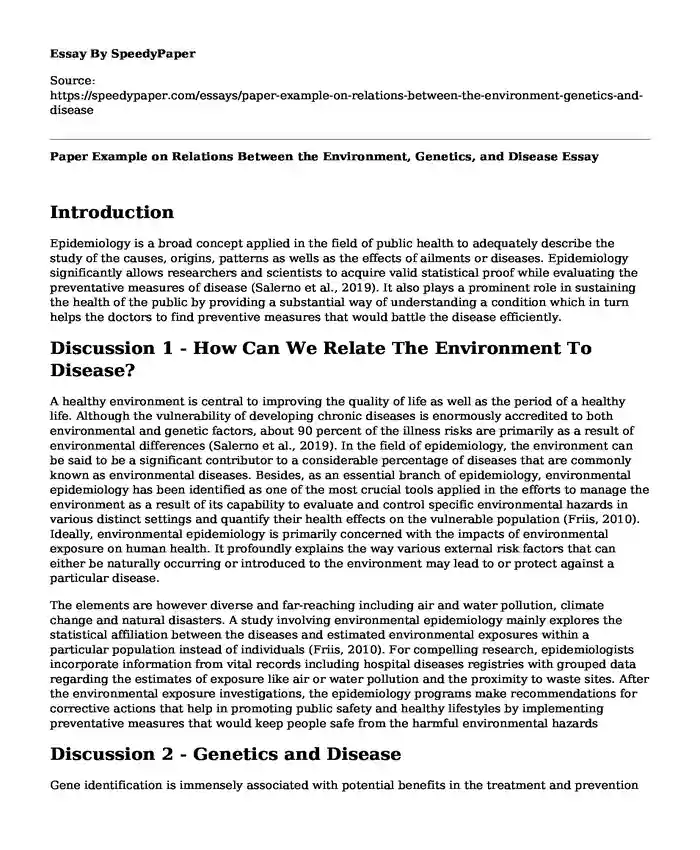
| Type of paper: | Course work |
| Categories: | Environment Genetics Public health |
| Pages: | 4 |
| Wordcount: | 828 words |
Introduction
Epidemiology is a broad concept applied in the field of public health to adequately describe the study of the causes, origins, patterns as wells as the effects of ailments or diseases. Epidemiology significantly allows researchers and scientists to acquire valid statistical proof while evaluating the preventative measures of disease (Salerno et al., 2019). It also plays a prominent role in sustaining the health of the public by providing a substantial way of understanding a condition which in turn helps the doctors to find preventive measures that would battle the disease efficiently.
Discussion 1 - How Can We Relate The Environment To Disease?
A healthy environment is central to improving the quality of life as well as the period of a healthy life. Although the vulnerability of developing chronic diseases is enormously accredited to both environmental and genetic factors, about 90 percent of the illness risks are primarily as a result of environmental differences (Salerno et al., 2019). In the field of epidemiology, the environment can be said to be a significant contributor to a considerable percentage of diseases that are commonly known as environmental diseases. Besides, as an essential branch of epidemiology, environmental epidemiology has been identified as one of the most crucial tools applied in the efforts to manage the environment as a result of its capability to evaluate and control specific environmental hazards in various distinct settings and quantify their health effects on the vulnerable population (Friis, 2010). Ideally, environmental epidemiology is primarily concerned with the impacts of environmental exposure on human health. It profoundly explains the way various external risk factors that can either be naturally occurring or introduced to the environment may lead to or protect against a particular disease.
The elements are however diverse and far-reaching including air and water pollution, climate change and natural disasters. A study involving environmental epidemiology mainly explores the statistical affiliation between the diseases and estimated environmental exposures within a particular population instead of individuals (Friis, 2010). For compelling research, epidemiologists incorporate information from vital records including hospital diseases registries with grouped data regarding the estimates of exposure like air or water pollution and the proximity to waste sites. After the environmental exposure investigations, the epidemiology programs make recommendations for corrective actions that help in promoting public safety and healthy lifestyles by implementing preventative measures that would keep people safe from the harmful environmental hazards
Discussion 2 - Genetics and Disease
Gene identification is immensely associated with potential benefits in the treatment and prevention of various diseases. As such, genetic epidemiology is currently a vital discipline in the field of public health adequately defined as the study of inherited factors that causes diseases as well as how the difference in the genetic material is associated with some of the environmental factors to augment or reduce the risk of infections (Friis, 2010). The study primarily seeks to determine the role of genetic factors in diseases that affect families and human populations where the findings are then applied in determining the appropriate medical diagnosis and therapy. Specific health conditions that have significantly identified to have a genetic basis include congenital malformations, Down syndrome, Hemophilia and sickle cell disease (Friis, 2010). However, over the past few years very little had been recognized regarding the genetic factors that cause human disease. But recently, the epidemiologic studies concerning the collection of genetic information has increased and continues to speed up mainly because the gene sequencing is faster and cheaper. The Human Genome Project by the United States Department of Energy is one of the most exceptional projects that have greatly helped in the identification of the specific genes present in human DNA. The primary objective of this project was thus to offer the researchers with essential tools to assess the genetic factors in diseases affecting human and then come up with new and effective strategies for their prevention, diagnosis, and treatment (U.S Department of Health & Human Services). Therefore, today the healthcare professionals can use the valuable information provided by the Human Genome project in finding the genetics causing inherited diseases and discover tests that would assist the patients in understanding their genetic risks for infection. Also, with the recent development of a HapMap of the human genes specifically the DNA, the epidemiologists can significantly identify the genes that hugely contribute to the universal human diseases, for example, the age-related blindness and obesity (U.S Department of Health & Human Services). Overall, both environmental and genetic epidemiology studies the relationship between the health outcome of the population and the exposures, paving the way for preventive measures and effective treatment.
References
Friis, R. (2010). Epidemiology 101. Jones & Bartlett Learning: Burlington, Massachusetts. ISBN 978-0-7637-5443-3
Salerno, J., Peters, E. S., Pinney, S. M., Morain, S., & Hlaing, W. M. (2019). Untangling the Ethical Intersection of Epidemiology, Human Subjects Research and Public Health. Annals of Epidemiology.
U.S Department of Health & Human Services. (n.d). "Human Genome Project" Retrieved from https://report.nih.gov/NIHfactsheets/ViewFactSheet.aspx?csid=45&key=H#H
Cite this page
Paper Example on Relations Between the Environment, Genetics, and Disease. (2022, Dec 20). Retrieved from https://speedypaper.com/essays/paper-example-on-relations-between-the-environment-genetics-and-disease
Request Removal
If you are the original author of this essay and no longer wish to have it published on the SpeedyPaper website, please click below to request its removal:
- Essay Sample on Sexual Transmission of Zika Virus
- Reflection Essay Sample: Approaches to Education
- Free essay example: Determining the effectiveness of introducing clients to business management
- Paper Example. Consumer Buying Influences and Behavior
- Paper Example: A Trade Deficit
- Essay Sample on Plato and Aristotle's Theories
- Paper Example. The Generational Gap
Popular categories




